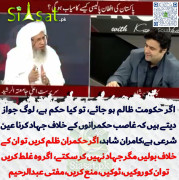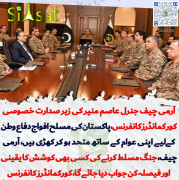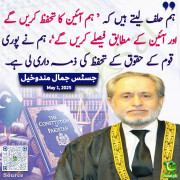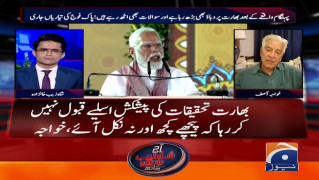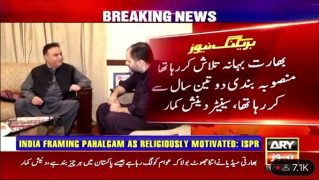I think a presidential system would suit Pakistan better. Parliamentary system does not suit a country where feudal landlords and rich people control the constituent electioneering, and as you mentioned a largely uneducated nation. I'm not saying do a complete replica of American presidential system however we can take the good things and develop our own based on our requirements. We need someone who can bring a breath of fresh air and re-organise the way this country is run in terms of state institutions. This would require re-writing the constitution. I think we need to gather the experts on Medinian constitution and model ourselves around that.
You are right that Presidential System is best in Pakistan. The circumstances in Pakistan make Parliamentarian System as a very bad choice for Pakistan. Main reasons are lack of education, Baradari System, Jageerdarana System and Lotacracy (i.e. tradition of Horse Trading & changing loyalties)
Today Pakistani People are fed up with present system, and they are confused and they don't know what to do in order to come over problems like corruption due to Baradari System, Jageerdarana System etc.. In every election, the same corrupt Jageerdars and big Political Families come to power again and again, and it will keep on happening in future too.
Even the new parties will also be forced use these same corrupt Jageerdars in order to win the elections (as we saw in the by election) in the rural areas.
Only due to this failure of Parliamentarian System, we are hearing the voices among masses for Dictatorship and Army or Supreme Court.
Any how, there is still one way left … there is still one alternative left i.e. Presidential System.
Sadly, the intellectuals, columnists and leaders of our Nation, they have not concentrated enough upon this alternative of Presidential System and although we hear few voices here and there about Presidential System, but still there is no good and serious study made about it according to the present circumstances of Pakistan.
It is irrelevant if Nation adopts this new Presidential System or not, but still there should be serious study upon it and we have to look at positives and negatives of this system. If we today talk about it and make nation aware of it, only then we could hope that Nation could adopt it in next 5-10 years.
How does the Presidential Sytem works
- In Parliamentarian system, the AWAM (public) get only ONE chance to go to the ballot box and choose the member for national assembly. Then those MPs (members of Parliament) choose the Prime Minister on bases of party system. Then this Prime Minister forms the Government.
- But in Presidential system, the importance of AWAM (people) increases as it gets TWO Chances to go to ballot box. Firstly in order to choose the members for Parliament. And secondly, when this AWAM (people) choose the President DIRECTLY. And then this directly elected President forms the government.
This President is free of blackmailing of different small Parties and independent candidates in Parliament while AWAM choose him directly.
Why Presidential System is better for Pakistan than Parliamentarian System?
1. Jageerdarana/Wadayra System
In Parliamentarian system, every constituency becomes very importance. Every member of parliament not only does the “
Legislation”, but also he is involved in “
Government-Making”.
In Pakistan, the Baradari system or Wadayra system are strong enough to get hold of small areas like one constituency, and get success there by unfair means. While a normal Pakistani, who is perhaps much more educated and loyal to Pakistan than that Wadayra, he has got absolutely no chance to win against these corrupt but powerful Wadayras.
In comparison to Parliamentarian system, the role of MPs is not so important in Presidential system and they are not strong to do the corruption. Their role is limited only to doing “
Legislation” for the country and they are no more involved in “
Government-Making”.
So, this Presidential system snatch the power of “Government-Making” from these wadayras, and give it to the whole Nation so that they could Directly elect the President themselves.
Therefore, even if there come no Land reforms in Pakistan, or we don't crush this Wadayra system, still we would be able to destroy the importance of this wadayra system by making it non-effective and powerless. Even if the results are not 100% (as in case of crushing them from root), still success rate will be much higher than in the present Parliamentarian system.
[Note: Wadaras have transferred their lands further to their relatives and there are very minute chances that any kind of land reforms could crush them successfully.]
2. The decrease in importance of Provincial Assemblies after introduction of Local Body System
Do you remember when the Local Body system was introduced and the Powers were transferred to the local Body system, then these wadayra and Jageerdars were not interested any more in becoming members of Provincial assemblies. In fact, many members of Provincial assemblies resigned from their seats and contested for the Local body elections.
Therefore, we could hope that we will witness the same thing in national assembly after the introduction of Presidential system when members will lose the right of “Government-Making” and there powers will be limited only to doing legislation. Therefore, at that time these seats of national assembly will be no more interesting for these corrupt Wadayras and Jagirdars while in Presidential system they are no more a duck which lays golden eggs. After that, only those people will contest for national assembly, who are serious and loyal in doing legislation for their country.
3. Cabinet Ministers are chosen only from the MPs in Parliamentarian system
One of the biggest flaw in Parliamentarian system is this that Cabinet Ministers could only be chosen from among the Mps (who are mostly illiterate, corrupt, incompetent and have become MP due to Wadayra power, or Baradari power).
In case of Pakistan, the prime minister has to chose the whole cabinet from 342 members of NA (and perhaps 100 of Senate). Actually, these figure are also not true, while prime minister choose the ministers ONLY from his party which reduce this number to 100-150 members.
Under the Presidential system, on the other hand, the President is not hampered by such considerations. He is not tied to, or subordinate to, the legislature. He is free to choose his cabinet of ministers from outside the members of the legislature. In this way, he can induct really competent, experienced and deserving people into the government. He can choose freely men of vision and integrity, of professional knowledge and practical experience.
4. Political Families and inheriting politics as business
In Pakistan, there are few Political Families and they inherit the politics to their family members as business. For example:
1. The brother of Nawaz Sharif. The son-in-law of Nawaz Sharif … and then other relatives like Abid Sher Ali, Bilal Yasin etc.
2. Chaudhry Shujaat and his family.
3. Asif Ali Zardari, his sisters and in future his son Bilawal.
Etc.
In comparison to Parliamentarian system, when the right of “Government-Making” will be shifted to the AWAM (public) directly, then this will also reduce this Family Politics system too (or at least reduce it's importance to great extent). Thus, it would not harm Pakistan too much as it is doing in Parliamentarian system at present.
5. The special quota seats for the women
In Parliamentarian system these women (who come on these special quota seats),they also participate in this “Government-Making” process. Therefore their importance also increases many folds. Hence you will see that wives, sisters and daughters of big Politicians and Families and corrupt Wadayras sitting upon these special quota seats. They are absolutely not interested in legislation for women, but more interested in “Government-Making”.
In Presidential system, this culture will come to an end as the role of these special quota seats will be limited only to legislation.
6. Lotacrary (Horse Trading)
This Lotacrary is only the gift of Parliamentarian system, while in Presidential system there is no place for lotacrary.
This lotacrary comes into being when one party has not got the decisive majority in the parliament and is unable to form the Government at it's own. Therefore, small parties and independent members become Lotas and they have then a price tag for their vote.
This lotacracy does not limited only to one time Government forming. No, during whole tenure of such government, they keep on blackmailing the government and doing corruption at their will, while Government has to stay quite upon their blackmailing.
In presidential system, while it is AWAM which chooses the President directly, therefore such President is fully free of any type of blackmailing of such small parties and lotas. The president has public support at his back thus making him independent of these lotas.
In Parliamentarian system, you will see big army of Ministers in cabinet while small parties and lotas demand their share in form of ministries. For example we have almost 90 Ministers in present government of Pakistan. Another example is of JUI (Fazlur Rehman Group) which has 7 seats in national assembly, but almost 6 ministries in the cabinet.
In Presidential system, once again we witness small number of ministers as small parties are unable to blackmail the President.
7. The presence of more small parties is not good for Parliamentarian System
Unfortunately:
- We have MANY small parties and groups and independent candidates in our national assembly of Pakistan. The Parliamentarian system works best when there are only 2 or 3 big parties present in the parliament, otherwise these small parties start playing lotacrary.
- Second unfortunate thing for Pakistan is this that none of these Political Parties has the decisive majority seats. At end, they have to become victim of blackmailing of small parties.
- Third unfortunate thing is this that all of these parties are limited to some specific areas of Pakistan. This is not a good sign for democracy or Parliamentarian system.
Due to these three problems, again Parliamentarian system is not good for Pakistan.
8. Is it blessing of Presidential System that Poor Person like Ahmadi Nejad became president of Iran?
Perhaps there are minute chances in Parliamentarian system too for such wonders. Any how, in Pakistani political culture, it is very difficult that in presence of Parliamentarian system and 2 big parties like PPP & Nawaz League, any poor but sincere person could become President/Prime Minister of Pakistan.
Even if any such wonder happens, still that Prime Minister will only prove to be an agent of these Rich and corrupt Pakistani Politicians. There is no chance he could run Pakistan according to his vision independently.
Only this presidential system could provide this chance to Pakistani AWAM (public) to choose any such talented and patriotic President for Pakistan, who will never come under pressure (/blackmailing) from these corrupt politicians.
9. Usage of Ghunda (Mafias) in Parliamentarian system to get votes
In Pakistan/India, the Ghunda (Mafias) are used to bring the voters to caste their votes. They are also bribed with Money and with food.
In Presidential system this evil will also be minimized. The Wadayrahs are not so much loyal to their parties to do all this for their parties. They do it only for themselves while they know they are doing a business while they could earn a lot of money if they win the elections in Parliamentarian system.
In Presidential system only those people come out to vote who are really close to any candidate politically and ideologically i.e. No fake vote in name of money, food or force.
During last Presidential Elections in Iran, then turn out was unbelievably high (i.e. 90 %). All that happened only due to the Ideological point of view and people came out at their own. In Pakistan people think there is no value of their vote while at end Wadayrah is going to win the race at every cost. Therefore turn out is very low in elections.
The Objections made upon the Presidential System
1. We need “Sincere“ people, and not the „New System“
The first, and the most common objection is: "We don't need a NEW system, but we need the "sincere" people who "implement" the system."
It sounds good, but in practical world, a sincere person is also some times helpless at hands of corrupt system and unable to do any thing.
For example, Supreme Court wants to crush the prices of sugar, but it didn't get any success under present Parliamentarian system while all Mill owners are themselves sitting in the cabinet and they could blackmail the government very very well.
Musharraf's era of 1999 till 2002 was best when without taking any US aid, he was able to strengthen the economy of Pakistan. Nawaz Government left only 0.30 Billion US Dollars and country was very close to be declared as Bank Corrupt. But Musharraf was able to increase the foreign exchange to 3 Billion dollar (from 0.30 Billions) without any US aid. But then Musharraf had also to take the support of corrupt politicians of Q-League in order to run this parliamentarian system.
We saw that Imran's party gets no seats in the parliament. And finally he is giving tickets to the same old corrupt political Lotas in by-elections, while these Lotas have more chances to be successful in the elections due to their Baradari or other corrupt reasons.
MQM is free of these corrupt Wadayrahs up till now, but when they will go to the rural areas (from Urban ones) then they also have to shake hands with Wadayrahs in order to get any success.
Therefore, your intention may be very pure, you may be very sincere, but after taking the "Wrong Decision", the chances of success are very minute. And this parliamentarian system is indeed that "Wrong Decision" in history of Pakistan which is harming the country for decades and every time same corrupt politicians coming to power again and again.
Allama Iqbal said about these same people:
آئین نو سے ڈرنا، طرز کہن پر اڑنا
منزل یہی کٹھن ہے قوموں کی زندگی میں
Iqbal says: "The most difficult step in life of a Nation is to take the NEW Steps. They are afraid of taking new steps, therefore they keep on sticking to the same old corrupt system."
Very truly said Sir Iqbal.
2. India is running the Parliamentarian system with success
This is the first objection which we hear from the opponents of Presidential system.
We request all readers to please study this
Article (link). After this you would realize that India is absolute not successful due to this Parliamentarian system and there are all evils present in Indian Parliamentarian system that we are facing in Pakistani Parliamentarian system. The Indians still realize that people sitting in their Parliament are very “Powerful” people, and their main interest is “Government-Making” and not the legislation. Thus we witness every kind of lotacrary and horse trading in Indian parliament. And we also witness the corrupt and most illiterate type of people are sitting in Indian assemblies.
At end, parliamentarian system is successful where whole nation is educated one, where there is no Baradari system, no corrupt and powerful Landlords who become even above the law due to their corrupt political powers.
Without these prerequisites, this parliamentarian system become very fatal for the nation.
We request all readers to please read this article about India. It is very interesting and we could learn a lot from it.
Please note, India went for Land Reforms and contrary to Pakistan, there is not such big problem of Wadayras or Jagirdars present in India as we have in Pakistan. But still Parliamentarian system brought some of the most corrupt Indian Politicians in the parliament, who base their politics upon Baradari system etc.
Please read the above mentioned article where Indian Intellectuals themselves cursing this Parliamentarian system while Political Parties started giving seats even to the CRIMINALs with enough Muscle Power and thus they could bring more and more seats to them.
It is strange that after so many years of parliamentarian system, the Indian Intellectuals want to transfer to Presidential system, but we are crying for India as being role model for us(
link).
2. In some countries, Presidential system converted into Dictatorship
Studies have been done upon Presidential system, and the biggest objection upon it is this that in few African and South American countries, the Presidential system converted into dictatorship.
It is a valid objection.
Nevertheless, in “Pakistan of Today”, there is 0% chance that “
Republican Presidential System” changes into any kind of dictatorship. These examples of African and South American countries are old, when there was no independent Media available and people didn't have enough awareness. But today we are watching a Media Revolution, especially in form of internet and mobiles. Today it is almost impossible.
Please note, Gen (rtd.) Musharraf was a “
Military President”, but still it was not possible for him to become real dictator in today's Pakistan. While we are talking here about “
Republican President” today.
In comparison to “Military President”, there are many checks upon “Republican President”. Assemblies not only work as opposition, but they are also check upon the President. We don't go in details in this short article, but briefly, if needed, we could introduce more checks according to circumstances of Pakistan.
3. Small Provinces could object upon Presidential System
The opponents also say that small provinces will protest that presidential candidate from Punjab would be able to get more votes why Punjab population is in majority.
This objection is not true. This allegation is already there in present Parliamentarian system while seats from Punjab are already in almost decisive number in Parliament. It is reality that Punjab makes almost half of Pakistan population and this reality could not be changed. Now what ever route you take, you come to the same result.
And we could also apply formulas, which could equate the Effects of total number of total votes from every Province in presidential system to the number of seats in present parliamentarian system from every Province. In every way, this problem is solvable.
In fact, present parliamentarian system is becoming a reason for provincial hatred. For example:
- Awami National Party of Mujeeb-ur-Rehman got the label of East Pakistan.
- Nawaz League got the label of representing only Punjab.
- MQM got the label of Karachi and Hyderabad.
- MMA got the label of Baluchistan and Khyber Pakhtunkhawa.
- And PPP has got the label of Sindh.
Therefore, the net system will be the same. Actually, there are chances of better results in Presidential System as individual Presidential Candidates could more free of these provincial tags as it is the case with present Political parties of Pakistan.
Conclusion:
According to present circumstances of Pakistan, the Presidential system has preference over parliamentarian system:
Firstly, the AWAM (public) will get the chance to directly select their leader (while in parliamentarian system President is chosen by corrupt parties and their corrupt politicians.- While President is DIRECTLY chosen by public, therefore no small parties would be able to blackmail him.
- You also don't see any lotacrarcy and horse trading in the assemblies. All this lotacrary is the blessing of parliamentarian system only.
Actually this thing is enough that Pakistan go for the Presidential system.
- In parliamentarian system, the Jagirdaars win in their constituencies due to being land lord in that area or due to Baradari system. The biggest benefit of presidential system is this that corruption of such Jagirdaars will become ineffective in Presidential system while their role will be limited to only legislation i.e. no more Government-Making.
- Pakistani Political Parties are very corrupt, and in form of present parliamentarian system, only these corrupt parties are going to come again and again and form government.
While only Presidential system gives this opportunity to Pakistani AWAM (public) to choose any competent and non corrupt President who could fight against these corrupt Politicians and do good for Pakistan.
By the grace of Allah, Pakistani Nation has always produced some extra ordinary Individuals. The nation know them. But in case of parliamentarian system, these people could never reach to the Government.
How the Presidential System could be introduced into Pakistan?
This is the toughest question. The present corrupt but powerful Politicians will oppose the presidential system to their best.
Any how, we don't know about the future. If state of things go worse in Pakistani and ever Supreme Court or Army get themselves involved, then both Supreme Court and Military should have an alternative option at their hand in form of Presidential system. They could go to the AWAM (public) in form of Referendum in order to impose Presidential system in Pakistan.
The Kenyans deciding for the Pure Presidential System and rejecting to trust their MPs
Kenyans have more experience than us (Pakistanies) about Parliamentarian, hybrid and Presidential systems. They have gone through almost all of these different systems and thus understand them much better than us and could make the best choice for themselves. Look what they are deciding recently for themselves.
(
Link to the Article)



